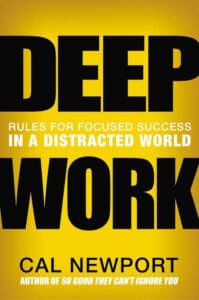This article was originally published under Read Write.
There’s so much happening in the world right now. It’s easy to forget that we’re living through a major upheaval in the way we work and live.
In fact, being constantly distracted by the latest political scandal or viral video is part of the problem: with so many shiny objects constantly vying for our attention, we’ve forgotten the benefits of deep concentration and given up some of our brainpower for the cheap thrills of the internet.
We live in the shallows, constantly flitting from one diversion to the next, never stopping long enough to really get a handle on the bigger questions in our work, our relationships, or even our lives.

“Who cares,” you might say. “So what if I’m addicted to my phone? So is everyone else.”
True. But consider this: a lot of the menial administrative tasks you do in your job are likely to be automated in the near future.
If you’re an employee, contractor, or even a small business owner, you will soon be competing with AI bots who can work more quickly and cheaply than you ever could.
Those who survive in the new economy will be the ones who can offer the kind of value that computers can’t: profound and counterintuitive insights, unique skillsets, and remarkable flexibility.
You can’t get any of those things by downloading an app.
Those who survive will have moved out of the shallows and embraced deep work.
What is Deep Work?

The concept of deep work comes from productivity expert and professor Cal Newport, who published a book titled Deep Work: Rules for Focused Success in a Distracted World.
In the book, Newport explains that there are two types of work.
Shallow work, which he defines as “non-cognitive, logistical” or minor duties performed in a state of distraction, and deep work, which he defines as “professional activities performed in a state of distraction-free concentration that push your cognitive capabilities to their limit. These efforts create new value, improve your skill, and are hard to replicate.”
Most people spend their days doing shallow work, and it’s often these low-value tasks that keep us from more important, higher-value work. For example, have you ever been trying to focus on a big project and been distracted by a trivial email that you felt you needed to respond to immediately?
Obviously, it is incredibly difficult to completely remove these types of distractions from your life, especially in the modern office environment. And, there’s a major reason why we’re more attracted to these types of tasks: they’re quick and easy and give us a sense of accomplishment. In the long term, however, they’re holding us back from bigger career and life goals.
So, what can you do about it?
Diving in Deep work isn’t about working harder or longer. It’s about working smarter. Ideally, deep work is about transforming your workdays from a random series of reactive events and chaotic busyness into a well-oiled schedule that allows you to prioritize the highest-value tasks.
Deep work is more than just a set of good habits. It’s a skill that needs to be learned. As Cal said when I interviewed him for my podcast, “the ability to perform deep work well is a skill that must be trained. It’s like playing the guitar—something you wouldn’t expect to be good at, unless you actually practiced and trained for a long period of time. It’s important to emphasize that because a lot of people think about deep work more like a habit, such as flossing their teeth.”

That might sound scary, but it isn’t. Here are four simple steps you can take to begin a deep work regime today:
Step 1: Schedule time for deep work
Reclaiming your focus means exercising control over your schedule. Start planning out your weeks and block out sections of time for deep work. How you do it is completely up to you. Some people prefer to alternate between sessions of deep work and more menial tasks on a single day, while others will block out multiple days in a row in order to achieve serious concentration.
The most important thing to remember is that you’re training yourself to reach a state of deep concentration, so you need to be disciplined in sticking to your routine.
Step 2: Create a distraction-free environment
Distractions come in all shapes and sizes, from phones to co-workers to kids—and you’re going to want to get rid of them all!
If you work in an open plan office, consider booking a private room or working from home if you can. If the internet is a problem for you, switch off your phone and disconnect your laptop. Stick to pen and paper or even go to the local library if you have to, just make sure you have a clear and calm environment that facilitates deep concentration.
It also helps to associate a particular location with deep work, for example a different office, or even a completely different building.
Step 3: Embrace rest and relaxation
Deep work isn’t just about cutting out distractions so you can focus on big projects. It’s also about getting a good night’s rest and turning up to work refreshed and relaxed. When you leave the office, avoid the temptation of answering emails or working late into the night.
It’s important to give your body and brain time to recuperate. Instead, spend your free time exploring your hobbies or focusing on your family and friends.

Step 4: Make yourself accountable
Deep work is about more than “getting Zen” at the office. It’s about improving your productivity, especially when it comes to high-value goals. If you don’t get anything finished, then there’s no point in upending your current work schedule. Create metrics to measure your productivity, and if you can, hold weekly review sessions to keep track of your progress.
The superpower of the 21st century
I agree with Cal when he says that deep work is “the superpower of the 21st century.”
As algorithms and robots take on more and more of the menial everyday tasks that keep businesses running, employers and clients are going to be looking to those who can provide real value to their bottom line. That means those who have trained themselves in the art of serious critical reflection.
It’s time to dive in to the deep end and tap into your deep work superman or superwoman. If you don’t, you’ll only be left behind.






